A soldier's decision to marry a South Korean woman despite having a wife and two kids back in the states could end up costing him tens of thousands of dollars in civil litigation.
It did not cost him his Army career.
Those actions, at least the version according to Lee's lawyers, read more like a TV crime procedural than real life:
- Four months after meeting Fuller, she and the soldier are married in a December 2013 ceremony, photos of which would later appear in the New York Post and on multiple New York TV news outlets.
- When Lee asks Fuller for the proper documents so she can make the marriage official, he provides allegedly forged Army and U.S. Embassy paperwork, which South Korean officials accept. The couple is married in the eyes of the state in April.
- Fuller allegedly leaves the country in May without telling his new bride.
- Lee finds out about the alleged forgery and files a criminal complaint. Fuller is brought back by the Army to South Korea for a five-month trial. He’s found guilty on fraud and forgery charges in October 2014 and sentenced to eight months in jail. He appeals.
- The couple reconciles as the courtroom proceedings move forward, and Fuller obtains a military-issued ID for Lee – this time allegedly forging a judgment of divorce from a U.S. court.
- The appeal, decided in April 2015, results in a $10,000 fine but no jail sentence.
- Lee learns the truth about Fuller’s marital status in August, when she finds messages to his stateside wife on his cellphone, including love notes regarding their anniversary.
- Fuller again returns to the states in September without telling Lee. She informs Korean prosecutors of the additional forgery, but they decline to prosecute. She requests an additional police investigation, into the matter, which is ongoing, and finds a law firm with offices in Seoul and New York City.
- Korean prosecutors appear to have a change of heart in November, reaching out to U.S. officials (which U.S. officials; which office? -- no idea; citing a report in a Korean-language newspaper.) regarding possible prosecution, according to a report in the Korean-language newspaper Munhwa Ilbo cited in a Nov. 30 Stars and Stripes article.

Rachel Lee, right, alleges that Master Sgt. Scott Fuller filed forged divorce paperwork after their wedding ceremony in South Korea, and remains married to a woman in the U.S.
Photo Credit: Courtesy of Song Law Firm
Fuller did not respond to several attempts to reach him to comment for this story and has not commented publicly on the matter. His marital status is unclear, and New York state law forbids public access to divorce records.
Army spokesmen would not discuss any disciplinary action he may have received regarding the incident, citing privacy concerns. Lee's lawyers said he was reduced in rank after the initial court verdict and later regained master sergeant status, a claim that appears to be supported by the paper trail: Lee's military ID card, a copy of which was provided by her legal team, lists her sponsor as a sergeant first class.
An international agreement may have ruled out court-martial, anyway, according to a statement on the case provided by 2nd Infantry Division.
"Any additional actions taken by the U.S. Army in response to [Fuller's] misconduct are subject to the Status of Forces Agreement (SOFA) between the United States and Korea," according to the statement. "In deference to the U.S.-Korea SOFA, the U.S. Army in Korea normally may not concurrently pursue charges in a case where the Republic of Korea has asserted primary jurisdiction."
Follow-up forgery?
The Army also would not address specifics regarding the investigation, including whether a Pre-Marital Certification Application (U.S. Forces Korea Form 163E) allegedly completed and filed by Fuller was genuine. Dongho Song, founder and managing member of Song Law Firm, told Army Times that Army officials informed his client that the paperwork provided by Fuller was "likely fraudulent."
The firm also provided to Army Times a "Judgment of Divorce" allegedly from New York's Rockland County, dated June 4, 2014, that lawyers said Fuller filed with the Army so Lee could receive her ID card. The county has no record of the document, an official in the county's records department said in an email, and uses a different index-number system than the one that appears on the form.

Rachel Lee is seeking $50,000 in compensation related to bigamy and forgery allegations against Master Sgt. Scott Fuller, right, and is contemplating further civil litigation, her lawyer said.
Photo Credit: Courtesy of Song Law Firm
"What would be more interesting is this lawsuit for damages," he said. "I do think that if the alleged victim is willing to come forward and state her case, she might be able to pursue that matter."
More court time
Lee's claim for damages — known as an Article 139 claim — includes moving expenses related to her relationship with Fuller, legal fees and $20,000 worth of "other costs," according to materials provided by her attorneys. Song said his firm intends to move forward in civil court, as well, but has had difficulty tracking Fuller down to determine whether such a lawsuit would be worth the trouble.
"If the person doesn't have any assets, it's useless because you can't enforce the judgment," Song said. However, the lawyer added that the retired infantryman "has a pension plan. He served the Army for a long time, so that's the source of the asset we're going to go after."
Civil proceedings could involve claims for emotional suffering that were not part of the Article 139 filing, Song said. Lee told the New York Post, via an interpreter, that she felt "suicidal" after the ordeal, which has received significant coverage in the South Korean press, Song said.
"He must understand that there is always consequences," Song said. "Also, he has to apologize to her. Because he just disappeared."
Kevin Lilley is the features editor of Military Times.




